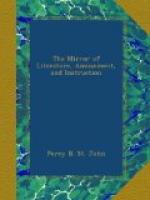Since thy original lapse, true liberty
Is lost.
He who loves to scatter crumbs of comfort in these starving times, will not despair at this sublime truth, but will seek to cherish the love of liberty, or the consolation for the loss of it wherever he goes.
The reader need not be told that we are friends to the spread of liberty: indeed, we think she may “triumph over time, clip his wings, pare his nails, file his teeth, turn back his hour-glass, blunt his scythe, and draw the hobnails out of his shoes;” but to show how this may be done, we must run over a few varieties of liberty for the benefit of such as do not enjoy the inestimable blessings of being free and easy: we quote these words, vulgar as they are; for, of all words in our vernacular tongue, to express comfort and security from ill, commend us to the expletive of free and easy. We had rather not meddle with civil or religious liberty: they are as combustible as the Cotopaxi, or the new governments, of South America; and our attempts at reformation do not extend beyond paper and print, which the unamused reader may burn or not, as he pleases without searing his own conscience or exciting our revenge. To be sure, a few of our examples may border on civil liberty; but we shall not seek to find parallels for the Ptolemaian cages, or the Tower of Famine, in our times; neither shall we feast upon the horrors of the French Revolution, nor the last polite reception of the Russians by headless Turks; notwithstanding all these examples would bear us out in our idea of the love of liberty, and the evils of the loss of it.
Kings often want liberty, even amidst the multitude of their luxuries. They are not unfrequently the veriest slaves at court, and liege and loyal as we are, we seldom hear of a king eating, drinking, and sleeping as other people do, without envying him so happy an interval from the cares of state, and the painted pomp of palaces. This it is that makes the domestic habits of kings so interesting to every one; and many a time have we crossed field after field to catch a glimpse of royalty, in a plain green chariot on the Brighton road, when we would not have put our heads out of window to see a procession to the House of Lords. Some kings have even gone so far in their love of plain life as to drop the king, which is a very pleasant sort of unkingship. Frederick the Great, at one of his literary entertainments adopted this plan to promote free conversation, when he reminded the circle that there was no monarch present, and that every one might think aloud. The conversation soon turned upon the faults of different governments and rulers, and general censures were passing from mouth to mouth pretty freely, when Frederick suddenly stayed the topic, by saying, “Peace, peace, gentlemen, have a care, the king is coming; it may be as well if he does not hear you, lest he should be obliged to be still worse than you.” Our Second Charles was very fond of liberty, and of dropping the king, or as some writers say, he never took the office up: this was for another purpose, in times when




